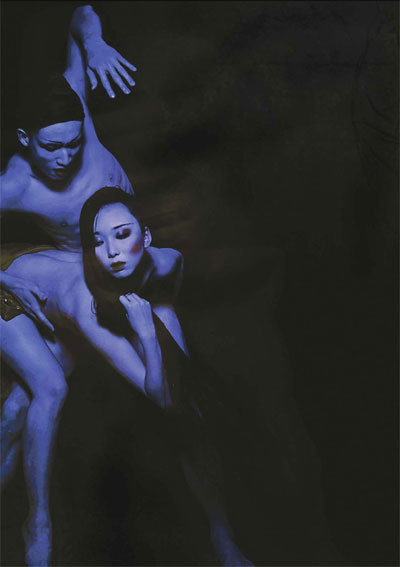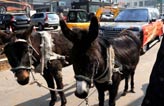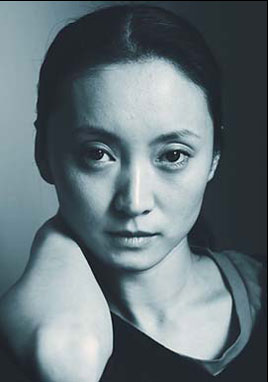Art
Dance of desire
Updated: 2011-03-15 07:55
By Raymond Zhou (China Daily)

The bawdy tale of an ancient Chinese Don Juan comes to life in a subversive dance drama that will debut in Hong Kong, Raymond Zhou reports.
When the often physical gesticulations and raw energies of modern dance meet a sensuous, almost erotic, subject matter, sparks will fly, maybe even an explosion will ensue that threatens to destroy conventions and blaze a new trail in artistic expression.
It occurred to Wang Yuanyuan around 2007-2008 to adapt Jin Ping Mei for the stage. The story is set in the Northern Song Dynasty (960-1127) and the novel appeared in the late Ming Dynasty (circa 1610), but the relentless pursuit of materialism (read: sex and money) resonates today more than ever.
Hailed as a literary masterpiece by scholars, Jin Ping Mei still carries the stigma of pornography, available only in truncated editions and to a limited readership. Yet, the sex adventures of the protagonist Ximen Qing and his female partners are widely known to the general public as the ultimate taboo in Chinese literature.
"Jin Ping Mei is most suitable for a dance drama," says Wang Yuanyuan, chairwoman and artistic director of Beijing Contemporary Dance Theater (BCDT). "Dance is abstract. It cannot compete with novels in terms of narrative exposition. Yet, it conveys the beauty of the human body."
BCDT's Golden Lotus, adopting the name of one of its English translations, will premiere at the Lyric Theater of HK Academy for Performing Arts on March 25-27, as part of the ongoing Hong Kong Arts Festival. Wang is not worried how the audience will react. "Each person has his or her own interpretation, and I did not think of audience feedback while choreographing the piece."
Unless the title Jin Ping Mei is changed, there is little chance the work can be presented in the mainland. But Wang is philosophical about it: "It was a more open and tolerant time when the novel came out. I want to recreate the kind of feeling similar to studying a Western painting with an erotic theme."
Wang explains that she sought a "special language" for this story, something that can use the body to express the soul. One important change is the shift from Ximen Qing, the male protagonist, to Pan Jinlian, one of the female characters, as the central role through which the plot evolves. Pan, the archetypal loose woman, is portrayed for "her survival instinct and her inner world" and the rest of the story is refracted through her eyes.
Liang Xing, one of the dancers who plays the role, does not take the traditionally critical view of Pan. "As I see it, she is candid, though not subtle. But she represents part of human nature, which was often repressed in the old days."
Liang loves the role because it gives her latitude for imagination. "Dance is not as realistic as a movie, you know."
Zhang Xiaochuan shares the role of Pan Jinlian. "My portrayal is more passive, as if she is dragged along by circumstances." She is also enamored by the striking image she is able to project on stage.
The dancers agree that Pan is not a "bad woman", but "true to herself". And for Yan Xiaoqiang, in the role of Ximen Qing, playing such a controversial part is not something to be feared. "I can still bring out part of me, the part that's buried inside and may not be known before." He adds that rehearsal of the piece has brought subtle changes to group dynamics. "It made us more open to human sexuality. We can approach the topic between the genders without evasion or subterfuge. It also helps create chemistry on the stage."
|
|
Wang encourages personal interpretations for the two casts. "Dancers have room to add their own texture and sexiness to the roles. Even though the movements are the same, they bring something of their own - with their fingers and gazes - that shape the characters the way they want it."
Wang started her career with traditional Chinese dance. From 2000 to 2002 she was trained at the prestigious Master of Fine Arts program at Los Angeles-based California Institute of Arts. "Traditional dance is all about norms and pretty moves while modern dance enables me to make new discoveries. The more protected a method, the more one feels the need to burst in expressive energy. The human body is fascinating, and the limbs alone have endless possibilities."
Wang has received awards for many of her works. She is behind such celebrated works as Raise the Red Lantern, a dance drama adapted by Zhang Yimou from his classic film. Yet, she was not satisfied until she established her own company.
The Beijing Contemporary Dance Theater was formed in April, 2008. Unlike the State-owned singing and dancing troupes, hers has to make its own living, including "paying the rent here", she says as she points to the studio inside the tennis hall of the 1990 Asian Games venue. But Wang is proud of her achievements: "The Golden Lotus is my seventh work since then."
Wang has always drawn inspiration from Chinese literary classics. Stirred from a Dream is based on Peony Pavilion, one of the greatest plays in China. "Life is short, but the soul is eternal. I want to capture that immortality of life and soul through this work." Haze has more urgency and relevance because of its subject of environmental degradation. "Artists have social responsibilities. We should not be blind to social reality and the issues of the day," she expounds.
Even though it is a challenge to run an independent performing arts company, Wang says she will never produce "trash" simply for the purpose of making money. She wants her dancers to be artists. "They came to a dance school with dreams and passion. But after the traditional process of training, many do not want to express any more. They only care about the accuracy of their movements."
At her company, she encourages her dancers to dig into themselves and find that special something that clicks with them, even for a controversial story like Jin Ping Mei. Her next project, she reveals, will be adapted from Lu Xun's grimly dark Pang Huang, another work that will require uncanny ability for introspection as well as technical brilliance.
E-paper

Rise and shine
The Chinese solar energy industry is heating up following recent setbacks in the nuclear sector
Preview of the coming issue
Bombs aim for regime change
CSI, with a twist
Specials

Donkey-powered Land Rover
Two donkeys pull a broken-down Land Rover in Shenyang, Liaoning province.

China Fashion Week
Models present creations for the Hosa Swimwear Trend Press Conference 2011.

Peony express
Growers of china's unofficial national flower are reaching out to europe for help

